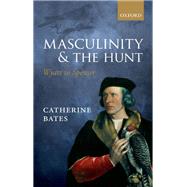Masculinity and the Hunt Wyatt to Spenser
, by Bates, Catherine- ISBN: 9780198778325 | 0198778325
- Cover: Paperback
- Copyright: 7/14/2016
As an age-old metaphor for the sexual chase, the hunt provides a uniquely conflicted site for the representation of masculinity. On the one hand, hunting had from ancient times served to define a particular and culturally-approved mode of masculinity as heroic, pursuant, and goal-oriented, where success was measured by the achievement of the objectives set: the capture and killing of prey. When applied to love, on the other hand, hunting was inflected quite differently. At first glance, the basic scenario of a male subject pursuing elusive quarry over which he ultimately comes to assert control might seem to epitomize the dynamic of the sexual chase, yet when poets invoke the hunt in an amorous context, this most obvious manifestation of the metaphor is not the one they put to use. On the contrary, in lyric poetry and romance, the hunt metaphor serves to demote or destabilize the masculine subject in some way. The huntsman is routinely a figure of failure: for all his efforts, he either fails to catch what he pursues, catches the wrong thing, ends up being caught by others, or runs round in circles chasing himself. His failure is measured precisely as a shortfall from the cultural ideal.
The metaphor of the hunt thus opens up possibilities for exploring definitions of masculinity that deviate from culturally approved models of mastery and power. It shows how limited those models are and offers examples of alternative and counter-cultural versions of a masculine subjectivity that radically query patriarchal stereotypes of gender and class. The hunt has been the subject of increased critical interest over last few years, partly as a result of itspoliticization as an issue, as reflected in recent changes to hunting legislation within the UK. Shifting attitudes to the hunt indicate that as a cultural phenomenon it continues to mobilize strong opinion and to activate notions of class and gender identity to this day. Masculinity and the Hunt is a unique study considering the link between hunting and masculinity in the literature of the sixteenth century.
The metaphor of the hunt thus opens up possibilities for exploring definitions of masculinity that deviate from culturally approved models of mastery and power. It shows how limited those models are and offers examples of alternative and counter-cultural versions of a masculine subjectivity that radically query patriarchal stereotypes of gender and class. The hunt has been the subject of increased critical interest over last few years, partly as a result of itspoliticization as an issue, as reflected in recent changes to hunting legislation within the UK. Shifting attitudes to the hunt indicate that as a cultural phenomenon it continues to mobilize strong opinion and to activate notions of class and gender identity to this day. Masculinity and the Hunt is a unique study considering the link between hunting and masculinity in the literature of the sixteenth century.







